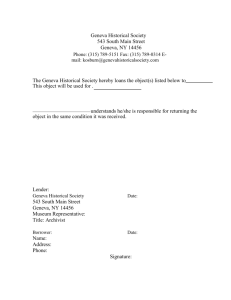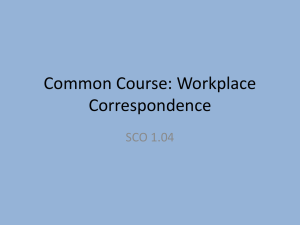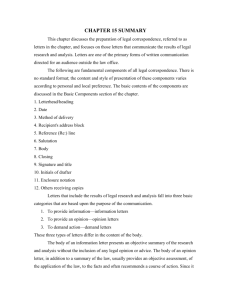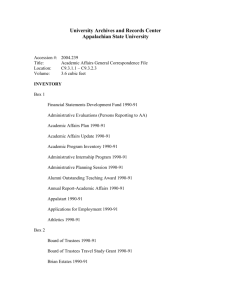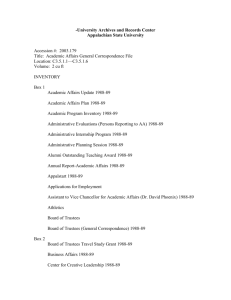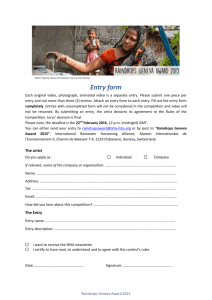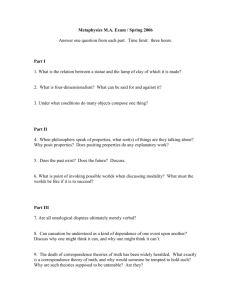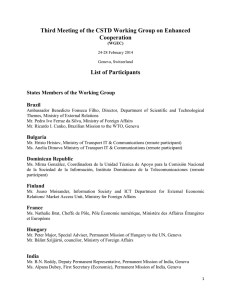Second Meeting of the Working Group on Enhanced Cooperation (WGEC)
advertisement
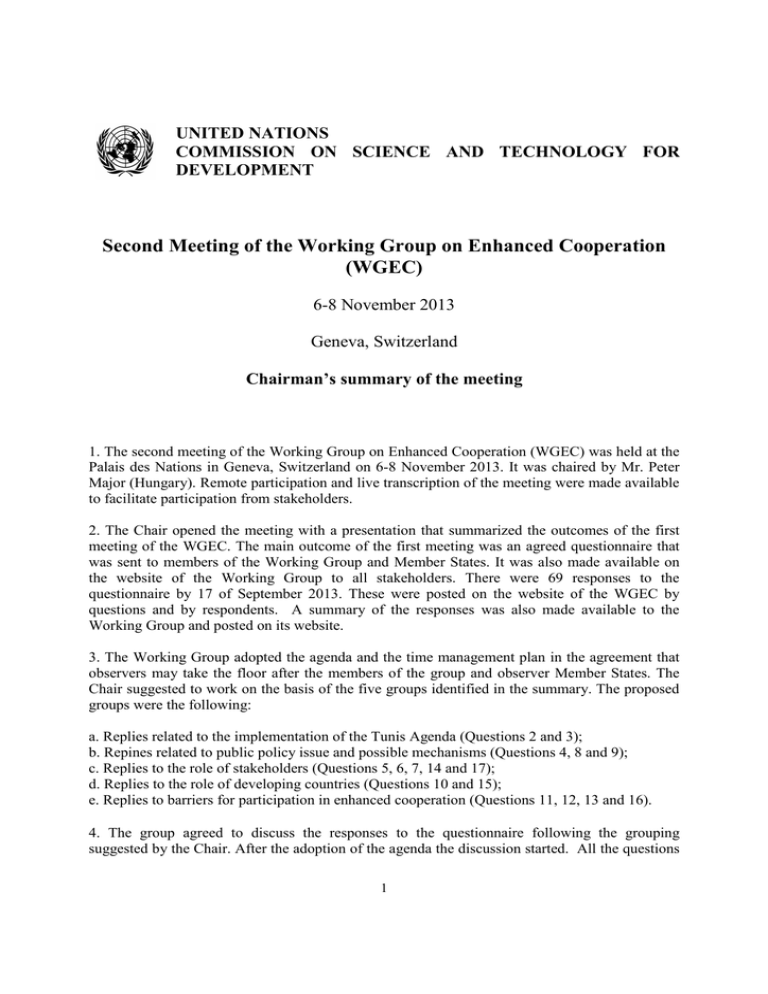
UNITED NATIONS COMMISSION ON SCIENCE AND TECHNOLOGY FOR DEVELOPMENT Second Meeting of the Working Group on Enhanced Cooperation (WGEC) 6-8 November 2013 Geneva, Switzerland Chairman’s summary of the meeting 1. The second meeting of the Working Group on Enhanced Cooperation (WGEC) was held at the Palais des Nations in Geneva, Switzerland on 6-8 November 2013. It was chaired by Mr. Peter Major (Hungary). Remote participation and live transcription of the meeting were made available to facilitate participation from stakeholders. 2. The Chair opened the meeting with a presentation that summarized the outcomes of the first meeting of the WGEC. The main outcome of the first meeting was an agreed questionnaire that was sent to members of the Working Group and Member States. It was also made available on the website of the Working Group to all stakeholders. There were 69 responses to the questionnaire by 17 of September 2013. These were posted on the website of the WGEC by questions and by respondents. A summary of the responses was also made available to the Working Group and posted on its website. 3. The Working Group adopted the agenda and the time management plan in the agreement that observers may take the floor after the members of the group and observer Member States. The Chair suggested to work on the basis of the five groups identified in the summary. The proposed groups were the following: a. Replies related to the implementation of the Tunis Agenda (Questions 2 and 3); b. Repines related to public policy issue and possible mechanisms (Questions 4, 8 and 9); c. Replies to the role of stakeholders (Questions 5, 6, 7, 14 and 17); d. Replies to the role of developing countries (Questions 10 and 15); e. Replies to barriers for participation in enhanced cooperation (Questions 11, 12, 13 and 16). 4. The group agreed to discuss the responses to the questionnaire following the grouping suggested by the Chair. After the adoption of the agenda the discussion started. All the questions 1 were discussed. Members of the group expressed their views and comments. The summary provided to the Members was appreciated and it was generally expressed that it facilitated the work of the group. 5. Members suggested to start a mapping exercise to identify the issues raised in their responses and to find existing mechanisms, if any, where the issues are being dealt with. A draft spread sheet was elaborated by some participants containing 483 issues identified and was later reduced to some 200 issues. It was suggested to create a correspondence group to follow on the exercise started in the Working Group to identify categories, mechanisms, and status. The terms of reference for the work of the correspondence group were formulated and agreed by the Working Group. Mr. Philip Rushton volunteered to coordinate the correspondence group. Ms. Joy Liddicoat volunteered as well to be the co-coordinator of the correspondence group. Several members volunteered to contribute to the mapping exercise. The final terms of reference for the correspondence group are annexed to this report. 6. India presented a possible framework for the final outcome document of the Working Group and this contribution will be made available on the group website once the contribution has been received in a written form by the Secretariat. The framework will be discussed in the third meeting of the Working Group. 7. Several members of the Working Group submitted contributions of draft recommendations to be considered by the group. The contributions will be made available on the website of the Working Group and will be discussed in the third meeting. 8. The Members of the Working Group decided to have its third meeting on 24-28 February 2014 in Geneva. 2 ANNEX 1 Final Terms of Reference for the Correspondence Group of WGEC 1. The correspondence group will work electronically. If necessary, conference calls will be held, but the main method of working will be emails. 2. The correspondence group is open to all stakeholders. 3. The correspondence group will provide three update reports to the WGEC Chair and Mailing List at: End of November 2013, beginning of January 2014 and End of January 2014. 4. The Correspondence Group will provide an initial output in the first week of January 2014 and a final document for consideration by the WGEC by the 12th of February 2014. 5. The Correspondence Group will: (a) Review the identified international public policy issues pertaining to the Internet in the spreadsheet that has been developed in the second meeting of the WGEC. (NB) Additional issues may be added to the identified public policy issues if agreed by the WGEC. (b) List where there are existing international mechanisms addressing the issues in the list (c) Identify the status of mechanisms, if any, whether they are addressing the issues (d) Attempt to identify the gaps in order to ascertain what type of recommendations may be required to be drafted by the WGEC. 6. Any issue that cannot reach consensus in the Correspondence Group will be referred to the Working Group, with the options that represent the range of opinions expressed in the Correspondence Group. The final decision on such issues will be made by the WGEC. 7. This Correspondence Group does not replace the WGEC and will not take any decision pertaining to the mandate of WGEC. As agreed by the Working Group on Enhanced Cooperation, 8 November 2013. 3 ANNEX 2 List of Participants States Members of the Working Group Brazil Mr. Benedicto Fonseca, Director, Department of Scientific and Technological Themes, Ministry of External Relations Dominican Republic Ms. Mirna González, Coordinadora de la Unidad Técnica de Apoyo para la Comisión Nacional de la Sociedad de la Información, Instituto Dominicano de la Telecomunicaciones (remote participant) Finland Ms. Mervi Kultamaa, Counsellor Information Society & Trade Facilitation, Ministry for Foreign Affairs of Finland (remote participant) Mr. Juuso Moisander, Ministry for Foreign Affairs of Finland France Ms. Nathalie Brat, Cheffe de Pôle, Pôle Économie numérique, Ministère des Affaires Étrangères et Européens Hungary Mr. Mark Horvath, Deputy Permanent Representative, Permanent Mission of Hungary to the UN, Geneva Mr. Peter Major, Special Adviser, Permanent Mission of Hungary to the UN, Geneva India Mr. B.N. Reddy, Deputy Permanent Representative, Permanent Mission of India, Geneva Ms. Alpana Dubey, First Secretary (Economic), Permanent Mission of India, Geneva Mr. Ajay Kumar Islamic Republic of Iran Mr. Jafar Barmaki First Counsellor, Permanent Mission, Geneva Japan Ms. Mari Ichikawa, Ministry of Internal Affairs and Communications, Japan Mr. Mitsuo Tsunoda, Ministry of Internal Affairs and Communications, Japan Mr. Makato Yokozawa, Nomura Research Institute, Government of Japan Mr. Naoya Bessho Government of Japan Latvia 4 H.E. Raimonds Jansons, Permanent Representative of the Republic of Latvia to the United Nations in Geneva Ms. Ilva Kase, Second Secretary, Permanent Mission of Latvia to the United Nations Ms. Elina Volksone Permanent Mission of Latvia Lesotho Mr. Moshe Kao, Minister Counsellor, Permanent Mission of Lesotho to the United Nations Office at Geneva Mexico Ms.Victoria Romero Permanent, First Secretary, Permanent Mission of Mexico to the International Organizations based in Geneva. Nigeria Mr. Eze Martin N, Senior Counsellor, Permanent Mission of Nigeria, Geneva Russian Federation Mr. Alexander Grishchenko, Ministry of Telecom, Russia Ms. Yulia Elanskaya, Ministry of Telecom, Russia Mr. Khroyushin Alexey Saudi Arabia Mr. Majed Almazyed, Communications and IT Commission Mr. Mansour Alqurashi, Communications and IT Commission Sweden Mr. Per Linner, Permanent Mission of Sweden Switzerland Mr. Patrick Pardo, Counsellor, Permanent Mission Mr. Dirk-Oliver Von der Emden, Federal Office of Communication (OFCOM) United States Ms. Marian Gordon, Foreign Affairs Officer, Office of International Communications and Information Policy, Bureau of Economic, Energy, and Business Affairs, Department of State Ms. Liesyl Franz, Foreign Affairs Officer, Office of the Coordinator for Cyber Issues, Office of the Secretary of State, Department of State Ms. Nicole Ozark, United States Mission Mr. Richard Johns, Economic Officer, United States Mission Mr. Chris Herrlein, Telecommunications and Information Administration, Department of Commerce Mr. Kiran Duwadi, Economist, International Bureau, Federal Communication Commission Other Stakeholders Members of the Working Group 5 Representatives from the Private Sector Mr. Virat Bhatia, Chairman, FICCI Communications and Digital Economy Committee/ICC BASIS Ms. Ellen Blacker, Vice President, Global Public Policy, the Walt Disney Company Ms. Marilyn Cade, ICT Strategies, mCade LLC Mr. Jimson Olufuye, Africa ICT Alliance Mr. Phil Rushton, Standards and Numbering Policy Strategy, BT/ ICCBASIS Representatives from Civil Society Mr. Carlos A. Afonso, Executive Director, NUPEF Institute Ms. Avri Doria, Independent Researcher (remote participant) Ms. Grace Githaiga, Associate, Kenya ICT Action Network Ms. Joy Liddicoat, Programme Leader for Human Rights on the Internet, Association for Progressive Communications (remote participant) Mr. Parminder Jeet Singh, Executive Director, IT for Change Representatives from the technical and academic communities Ms. Constance Bommelaer, Director of Public Policy, The Internet Society Mr. Alex Corenthin, Director of Information Systems, Cheikh Anta Diop University (remote participant) Mr. Baher Esmat, Vice President of Stakeholder Engagement for the Middle East, Internet Corporation for Assigned Names and Numbers Mr. Andrés Piazza, External Relations Officer, Latin American and Caribbean Internet Addresses Registry Representatives from intergovernmental and international organizations Mr. Preetam Maloor, International Telecommunication Union Mr. Jeounghee Kim, International Telecommunication Union Mr. Wai-Min Kwok, United Nations Department of Economic and Social Affairs (remote participant) Mr. Patrick Spearing, United Nations Department of Economic and Social Affairs (remote participant) Members States Observers Australia Ms. Jeffie Kaine, Permanent Mission of Australia Canada Mr. Paul Charlton, First Secretary, Permanent Mission of Canada Pakistan Ms. Fareha Bugti, First Secretary, Permanent Mission of Pakistan to the United Nations Geneva South Africa 6 Mr. Pragashnie Adurthy, First Secretary, Permanent Mission of South Africa United Kingdom Ms. Alexandra Cole, First Secretary Cyber and Disarmament, United Kingdom Mission to the UN in Geneva Other Stakeholders Observers Ms. Samantha Dickinson, Internet Governance Consultant Prof. William Drake, Media & Innovation Division, IPMZ, University of Zurich, Chair, Noncommercial Users Constituency ICANN Ms. Lea Kaspar, Project Manager, Global Partners Ms. Sirirat Kiatichaipaibul, IGF Secretariat Mr. Wolfgang Kleinwachter, University of Aarhus Ms, Delphine Lida, Permanent Delegation of the EU to the UN Office and other international organisations in Geneva Mr. Mathew Shears, Director and Representative, Center for Democracy and Technology UNCTAD Ms. Anne Miroux, Director, Division on Technology and Logistics Mr. Mongi Hamdi, Head CSTD Secretariat, and Science, Technology & ICT Branch Ms. Padmashree Gehl Sampath, Chief, Science and Technology Section Ms. Claudia Contreras Rojas, Economic Affairs Officer, Science and Technology Section Mr. Tansug OK, Associate Economic Affairs Officer, Science and Technology Section Mr. Abiy Solomon, Associate Economic Affairs Officer, Science and Technology Section 7
